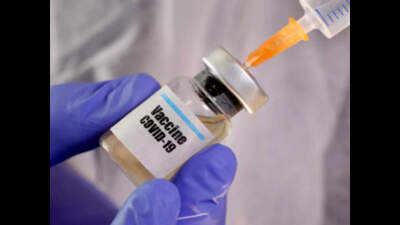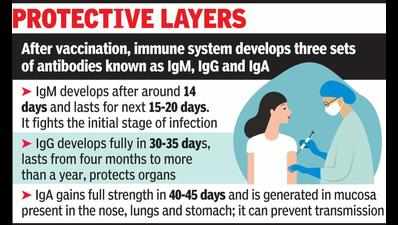- News
- City News
- lucknow News
- Precautions must continue even after vaccination for safety of all: Experts
Trending
This story is from January 25, 2021
Precautions must continue even after vaccination for safety of all: Experts
Getting the Covid-19 vaccine does not mean that one is completely immune to getting novel coronavirus infection.
LUCKNOW: Getting the Covid-19 vaccine does not mean that one is completely immune to getting novel coronavirus infection.
Masks, physical distancing and hand hygiene are must even after inoculation because the vaccine takes a few weeks to create enough antibodies required for immunisation, hence a beneficiary can catch infection during this period, warned experts.
Further, the antibodies, after developing in required numbers, fight and destroy the virus if a recipient acquires the infection. The battle goes on for a few days inside the body before the defence mechanism developed by the vaccine succeeds in annihilating the virus. While the fight is underway, the recipient does not fall sick, but carries the virus and can silently transmit it to others, they cautioned.
It is similar to an asymptomatic patient who develops antibodies naturally and gets cured without even knowing that she/he has been infected. If such a person does not follow safety protocols, he/she can easily pass the virus to others.
“IgM develops in blood cells around 14 days after the first dose and lasts for next 15-20 days. It fights the initial stage of infection,” he said. “In between, the body also starts generating IgG and IgA. While IgG develops fully in 30-35 days after first dose, IgA gains full strength in 40-45 days”, he added.
“IgG antibodies also develop in blood cells and provide longer immunity—four months to more than a year. Their prime task is to protect organs,” he said.
“IgA antibodies are generated in mucosa present in the nose, lungs and stomach. They last for about a year or more and destroy the virus as soon as it reaches the nose or any other secretary gland. This makes IgA’s role crucial because killing the virus at the initial stage reduces possibilities of transmission,” he explained.
Dr Gulati also said, “The time taken for development of antibodies can differ from person to person depending on her/his immune response. Further, the efficacy of vaccines developed so far is between 70% and 90%, which leaves scope for infection to grow and cause illness, besides transmission. Therefore, safety protocols even after vaccination are very important.”
Emphasising on the same, head of pulmonary medicine at KGMU Prof Surya Kant said, “The vaccine will protect a recipient from getting seriously ill upon acquiring infection, but she/he can still pass on the virus to others while sneezing and breathing, hence safety protocols are a must even after vaccination for a year or till 70% of the population gets vaccinated.”
“Full-fledged antibodies develop in 15 days to 21 days after vaccination. It prevents serious illness, but it is still unclear if these antibodies prevent the vaccinated person from getting infected and transmitting the virus to others,” said Dr D Himanshu, medical superintendent at KGMU.
Masks, physical distancing and hand hygiene are must even after inoculation because the vaccine takes a few weeks to create enough antibodies required for immunisation, hence a beneficiary can catch infection during this period, warned experts.
Further, the antibodies, after developing in required numbers, fight and destroy the virus if a recipient acquires the infection. The battle goes on for a few days inside the body before the defence mechanism developed by the vaccine succeeds in annihilating the virus. While the fight is underway, the recipient does not fall sick, but carries the virus and can silently transmit it to others, they cautioned.
It is similar to an asymptomatic patient who develops antibodies naturally and gets cured without even knowing that she/he has been infected. If such a person does not follow safety protocols, he/she can easily pass the virus to others.
Explaining how the vaccine works, director of Institute of Medical Sciences, BHU, Prof Anil Kumar Gulati said, “After getting the first dose of Covid-19 vaccine, cells produce spike protein as found in novel coronavirus. The immune system identifies this protein and develops three sets of antibodies known as IgM, IgG and IgA. The second dose given after 28 days acts as a booster.”
“IgM develops in blood cells around 14 days after the first dose and lasts for next 15-20 days. It fights the initial stage of infection,” he said. “In between, the body also starts generating IgG and IgA. While IgG develops fully in 30-35 days after first dose, IgA gains full strength in 40-45 days”, he added.
“IgG antibodies also develop in blood cells and provide longer immunity—four months to more than a year. Their prime task is to protect organs,” he said.
“IgA antibodies are generated in mucosa present in the nose, lungs and stomach. They last for about a year or more and destroy the virus as soon as it reaches the nose or any other secretary gland. This makes IgA’s role crucial because killing the virus at the initial stage reduces possibilities of transmission,” he explained.
Dr Gulati also said, “The time taken for development of antibodies can differ from person to person depending on her/his immune response. Further, the efficacy of vaccines developed so far is between 70% and 90%, which leaves scope for infection to grow and cause illness, besides transmission. Therefore, safety protocols even after vaccination are very important.”
Emphasising on the same, head of pulmonary medicine at KGMU Prof Surya Kant said, “The vaccine will protect a recipient from getting seriously ill upon acquiring infection, but she/he can still pass on the virus to others while sneezing and breathing, hence safety protocols are a must even after vaccination for a year or till 70% of the population gets vaccinated.”
“Full-fledged antibodies develop in 15 days to 21 days after vaccination. It prevents serious illness, but it is still unclear if these antibodies prevent the vaccinated person from getting infected and transmitting the virus to others,” said Dr D Himanshu, medical superintendent at KGMU.
End of Article
FOLLOW US ON SOCIAL MEDIA












